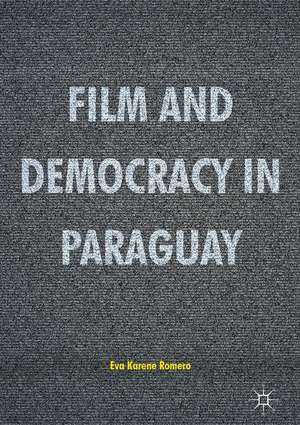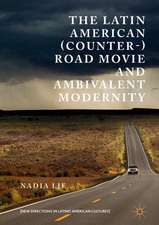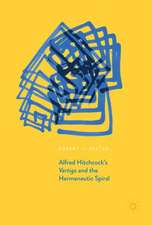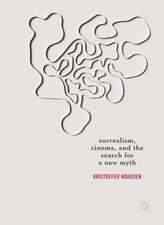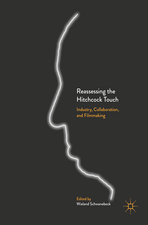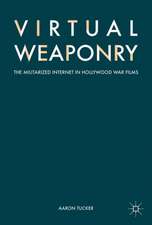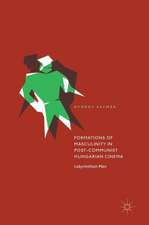Film and Democracy in Paraguay
Autor Eva Karene Romeroen Limba Engleză Hardback – 16 dec 2016
| Toate formatele și edițiile | Preț | Express |
|---|---|---|
| Paperback (1) | 577.07 lei 6-8 săpt. | |
| Springer International Publishing – 15 iul 2018 | 577.07 lei 6-8 săpt. | |
| Hardback (1) | 582.80 lei 6-8 săpt. | |
| Springer International Publishing – 16 dec 2016 | 582.80 lei 6-8 săpt. |
Preț: 582.80 lei
Preț vechi: 685.65 lei
-15% Nou
Puncte Express: 874
Preț estimativ în valută:
111.52€ • 119.25$ • 92.98£
111.52€ • 119.25$ • 92.98£
Carte tipărită la comandă
Livrare economică 17 aprilie-01 mai
Preluare comenzi: 021 569.72.76
Specificații
ISBN-13: 9783319448138
ISBN-10: 3319448137
Pagini: 208
Ilustrații: XIII, 169 p. 18 illus., 15 illus. in color.
Dimensiuni: 148 x 210 x 15 mm
Greutate: 0.39 kg
Ediția:1st ed. 2016
Editura: Springer International Publishing
Colecția Palgrave Macmillan
Locul publicării:Cham, Switzerland
ISBN-10: 3319448137
Pagini: 208
Ilustrații: XIII, 169 p. 18 illus., 15 illus. in color.
Dimensiuni: 148 x 210 x 15 mm
Greutate: 0.39 kg
Ediția:1st ed. 2016
Editura: Springer International Publishing
Colecția Palgrave Macmillan
Locul publicării:Cham, Switzerland
Cuprins
Introduction.- 1. Hamaca paraguaya (2006): the Campesino and Circular Time.- 2. Frankfurt (2008): Documentary, Fútbol, and the Campesino Icon.- 3. Film, Rape, and the Nation: Karai norte (2009) and Noche adentro (2010).- 4. Queering Paraguayan Film: Cuchillo de palo (2010) and Semana capital (2010)”.- 5. The Child as Paraguay’s Future: Calle Última (2010), Mita´í (2011), and 7 cajas (2012).
Recenzii
“Eva Karene Romero’s study of Paraguayan cinema is the first monograph about the nation’s cinema, but it is also much more than that. … Romero’s book comes at a very opportune moment. Not only is this a watershed text about an overlooked aspect of the culture of a country that remains little known, but it was written as cineastes in Paraguay lobbied their government to pass a cinema law.” (Catherine Leen, Bulletin of Spanish Visual Studies, Vol. 3 (1), 2019)
Notă biografică
Eva Karene Romero studies the arts and culture of Latin America and the US Southwest. She has lectured at The University of Arizona, USA, and published in Hispania and the Journal of Latin American Cultural Studies. She currently serves on the Board of Directors at the Arts Foundation for Tucson and Southern Arizona.
Textul de pe ultima copertă
This book is dedicated to the study of Paraguayan film, particularly small cinemas and movies which represent a socio-politically charged perspective that has until now been overlooked in Latin American Studies. Romero demonstrates that these films are critical to understanding the dynamics of politics and cultural identity in Latin America as a whole. An in-depth exploration of the Latin American post-dictatorial transition of power Romero investigates this contemporary crisis through the dynamics of race, class, gender, and sexuality. Each chapter takes a film or films as its jumping off point, then zooms out to encompass elements of the national political, economic, social, and historical context. Romero analyzes some of the most pressing social issues in Paraguay while reflecting on the power of cultural discourse through film.
Caracteristici
Theorizes how seemingly depoliticized films can instead work in service of politically disruptive missions Highlights how new democrat filmmakers in Paraguay use visual and linguistic approaches alike to comment upon and upend hegemony in Paraguay and Latin America more broadly Argues the value of studying Paraguayan Film within the context of the sustainment of democracy and popular identity, a value central to the political climate across Latin America
